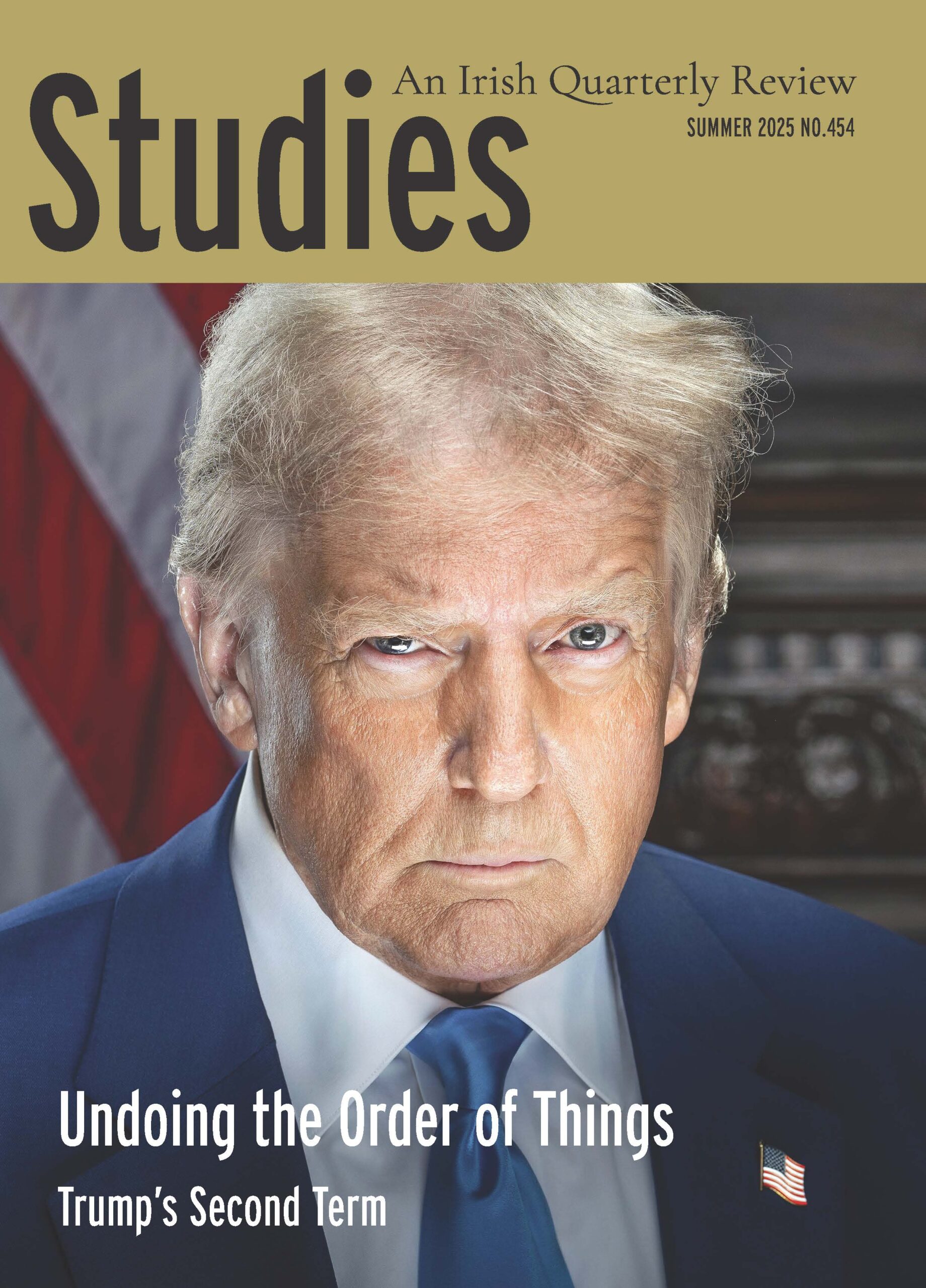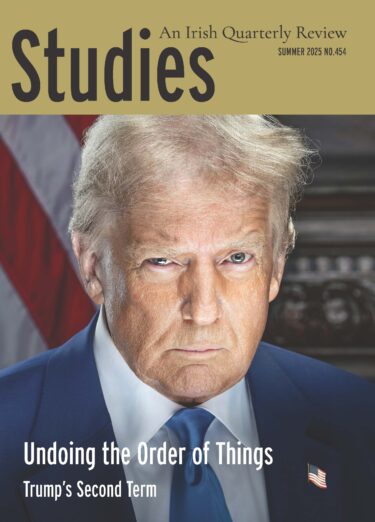Showing all 12 results
Undoing the Order of Things: Summer 2025, Volume 114, No 454

Full Issue
€10.00+p&p
On 21 April, as this issue of Studies was being prepared for publication, Pope Francis died. The public manifestation of mourning and of grateful tribute was extraordinary – in Rome alone, 250,000 people congregated in St Peter’s Square, and nearly 150,000 more lined the route from the Vatican to Santa Maria Maggiore, one of the four major basilicas in Rome, where Francis was interred. The pope expressed his wish to be laid to rest there in his spiritual testament, which he wrote...
Read Editorial
On 21 April, as this issue of Studies was being prepared for publication, Pope Francis died. The public manifestation of mourning and of grateful tribute was extraordinary – in Rome alone, 250,000 people congregated in St Peter’s Square, and nearly 150,000 more lined the route from the Vatican to Santa Maria Maggiore, one of the four major basilicas in Rome, where Francis was interred. The pope expressed his wish to be laid to rest there in his spiritual testament, which he wrote in 2022 as he sensed the end of his life approaching. ‘The suffering that marked the final part of my life,’ he concluded his testament, ‘I offer to the Lord, for peace in the world and brotherhood among peoples.’
Peace in the world, brotherhood – solidarity – among peoples: these were the constant themes of Francis’s papacy. In his first encyclical, Evangelii Gaudium, he emphasised the need ‘to make the kingdom of God present in our world’,1 a goal that requires ‘the liberation and promotion of the poor’.2 Francis never tired of repeating this. What he did was bring the urgent need to address poverty into connection with other pressing needs. The message in his 2015 encyclical, Laudato Si’, is clear: ‘global solidarity’ begins with the realisation that ‘everything is interconnected’ – human life and the natural world around us. ‘We are faced not with two separate crises,’ the Pope wrote, ‘one environmental and the other social, but rather with one complex crisis which is both social and environmental.’3 Given this interconnectedness, he saw the economic, social, environmental, and cultural dimensions of life as constituent elements of an overarching ‘integral ecology’, ‘inseparable from the notion of the common good’.4 Pope Francis was not the first person to use the term ‘integral ecology’, but he set it in a theological frame and gave it magisterial weight, and that will count as an important part of his legacy.
Sadly, the world which he addressed in these encyclicals was rapidly drifting further and further from any effective sense of solidarity. In 2017, Oxfam reported that just eight men owned as much wealth as the poorest half of the world. And things have got even further out of hand since then. Billionaire wealth, Oxfam says now, rose three times faster in 2024 than in
2023, and at least five trillionaires are expected within a decade. Meanwhile, the number of people living in poverty has barely changed since 1990. Inequality is out of control.
The staggering levels of extreme wealth and chronic inequality are merely part of a widescale loss of solidarity. Again, everything is interconnected. Economic colonialism has devastated some of the poorest regions of the world; it has stripped them of natural resources and causes deforestation, desertification, and pollution. On top of the harrowing poverty, hunger and death that this has caused, it has exacerbated the ecological crisis, and the result is large numbers of climate refugees and economic migrants. And economic exploitation is also implicated in the rise of corruption and conflict in these regions, which in turn has led to unprecedented numbers of political refugees and asylum seekers. The knock-on effect continues then with the rise in destination countries of racism, xenophobia, and ethnonationalism. Not uncommonly, even in countries with robust democratic traditions, the rights of vulnerable people are eroded and legal protection is removed. We are in a world now, as Pope Francis wrote in Fratelli Tutti, ‘that races ahead, yet lacks a shared roadmap’.5 And why? Because ‘the gap between concern for one’s personal well-being and the prosperity of the larger human family seems to be stretching to the point of complete division between individuals and human community’. The most depleted resource of all, it seems, is solidarity.
It is mercy, according to Francis, that gives rise to solidarity. Mercy is evidently the most prominent leitmotif in his teaching. It is, he repeated often, the name of God. But mercy for him is not solely about God’s mercy. It needs to be translated into the human world of the strong and the weak, of those who have the comforts of life and those who have been left without them. Not condescending mercy, bestowed out of the largesse of people who see themselves as superior; rather, humble mercy, mercy that takes its meaning and its range from justice and from love. Mercy, Francis told a general audience in 2016, ‘is a way of life’.6 It is also the way of life for a Christian. It is not optional. ‘Jesus’ teaching does not provide any means of escape’, he continued: ‘I was hungry and you gave me food, I was thirsty and you gave me drink, I was a stranger and you welcomed me, I was in prison and you came to me. You cannot delay when faced with a person who is hungry: you must give something to eat. Jesus tells us this. The works of mercy are not theoretical ideas, but consist instead of concrete witness. We need to roll up our sleeves to alleviate suffering.’
Francis will be remembered, no doubt, for this kind of forthright and down-to-earth diction, but mostly his place in the tradition is assured because of his repeated insistence that mercy – both human and divine – changes everything.
***
‘If nothing changes,’ former UK prime minister Gordon Brown wrote recently in The Guardian, ‘the 2020s risks being remembered as this century’s devil’s decade – the term historians once used for the 1930s.’7 ‘It will be defined’, he continued, ‘not just by seven million people who have died of Covid-19 and rising global poverty and inequality – but also by a dismembered Ukraine, a burnt-out Gaza, and little-reported atrocities in Africa and Asia, each testimony to the violent displacement of a rules-based global order by a power-based one.’ What makes all this a great deal worse than any comparable time of crisis is that the United States, which has so often been a substantial part of the solution, has now become part of the problem. There can be no doubting the dramatic democratic backsliding during the first months of Trump’s second term. Nor indeed the evaporation of his country’s commitments to the greater world beyond – providing humanitarian aid, brokering peace without looking for a return, promoting global climate justice, offering security to countries under unjust threat, funding health initiatives in the developing world. Truly, the second term of Donald Trump appears to be an epoch-defining event.
In ‘Trump’s Return: Polanyian Perspectives’, Peadar Kirby turns to Karl Polanyi’s most acclaimed text, The Great Transformation, in an effort to understand the appeal of Trumpism and of the far-right more generally. Polanyi observed that modern capitalism, which emerged from an all-embracing marketisation, proved to be incompatible with democracy. Right-wing policies have tended either to restrict the administrative state – and democratic freedoms with it – or in more recent days to replace the democratic state with ‘a kind of techno-feudal state to be run like a corporation with the president as its CEO’. Polanyi perceived that fascism in 1930s Europe was about saving capitalism by reconstituting it on a national basis through the coercive power of the state. That in effect is Trump’s project too.
In ‘Whose Liberty? Which Liberalism?’, prompted by J. D. Vance’s distorted defence of Trump’s inhumane policies regarding migrants, Patrick Riordan SJ questions the merit of the postliberalism to which Vance
subscribes. He is concerned that, while it rightly rejects certain aspects of liberalism, it runs the danger of ‘eroding the solid core of value of “liberty”’. Riordan makes distinctions between the many terms that invoke this quality: ‘liberty’, ‘liberalism’, ‘liberation’, ‘neoliberalism’, ‘libertarianism’, and so on. It all depends on who the subject of liberty is presumed to be. By way of setting a gold standard for liberty, Riordan examines the Second Vatican Council’s insistence on the dignity of the human person requiring that the liberties and rights of persons be respected in civil law.
Covering some of the same territory as Riordan, the present writer, in ‘J. D. Vance, Catholicism, and the Postliberal Turn’, examines the world of Catholic postliberalism into which Vance stepped with his conversion in 2019. Vance described the impact that the works of French Catholic anthropologist René Girard had on him in the lead-up to his conversion, specifically his description of scapegoats; yet, the essay argues, Vance’s political behaviour since aligning himself with Trump shows a closer affinity with the vision of the German legal thinker Carl Schmitt, an advocate of authoritarianism, than with the thought of Girard.
In ‘MAGA: Making Athens Great Again, Then and Now’, Fiachra Long detects a parallel between the rise of oligarchy in fifth-century BCE Athens and present-day America. In both cases politics is founded on power and on verbal manipulation. Long examines Plato’s Gorgias, in which Socrates exposes the lack of a sense of justice and of a moral stance in the rhetoric of politicians who don’t care to communicate properly, but merely use ‘decorative speech’ to sustain a ‘might is right’ regime. The propensity to deception and to violence that was evident in ancient Greece is on display today too, in the US, in Gaza, in Ukraine, and in Russia.
Mark Garavan is also concerned by the rise of a ‘might is right’ culture – just one aspect of a broader disintegration of the human in today’s world. In ‘Care and Contemplation: Pathways to Recovery’ he reflects on the deeply unsettling events of recent days – the casting out of the Other in Trump’s America, the slaughter in Gaza, climate crisis events, and the like. We have become a ‘careless’ world, a world of isolated selves that have turned inwards. The remedy Garavan proposes is firstly to become more contemplative – slow down and pay more attention – and secondly to learn to care, to change our orientation from the self to the Other.
In ‘Nationhood and Europe: The Need for Nuance’, Kevin Williams is prompted by the rise of exclusivist nationalism, as well as by Trump’s
dismantling of a communal order of justice and mercy, to reflect on nationhood in the context of Europe. Acknowledging that there are many fronts on which cultural unity between European nations is weak, he argues that the most important element of civic culture that holds the nations of Europe together is the acceptance of democratic ideals – respect for the rule of law and for individual freedom, plus commitment to equality and the maintenance of a distinction between religious ordinance and civil law. As such, Europe is a historic achievement that deserves to be cherished.
***
Apart from the essays occasioned by events in global politics, this issue of Studies also carries a number of disparate essays on cultural themes. In ‘Gerard Manley Hopkins and the Catholic Death’, Eamon Kiernan traces Hopkins’s persistent fascination with death, especially as it is apparent in three compositions: a prose meditation and two poems. The poet’s understanding of death, Kiernan judges, is ‘apocalyptic’, that is it anticipates a ‘moral finalisation of the person which is transformational towards the present moment’.
Elise Lefeuvre considers the value of the Rule of St Benedict to Christian lives beyond the monastery in ‘Quisquis Ergo: The Rule of St Benedict as a Guide for Ordinary Life in a Secular Age’. She considers what the Rule can offer to any individual who wishes to achieve a happy and authentic life; also what insights it can offer to secular community – even corporate – life; and of course what resources it makes available for anyone who wishes to shape their lives according to the teachings of Christ.
In ‘Correcting Ireland’s Over-Protection of Property’, William Kingston considers Ireland’s inordinately high level of legal protection of the right to individual property, in accordance with Article 43 of the Irish constitution. De Valera’s clerical guides, John Charles McQuaid and Edward Cahill SJ, wrongly believed that the status afforded to private property in Pope Leo XIII’s Rerum Novarum simply expressed the Church’s unbroken intellectual tradition. Things were more complicated than that.
Eileen Kane, in ‘Stained Glass in a Dublin Church: Context and Attribution’, examines the stained-glass work in the Church of St John the Baptist, a Catholic church on the Clontarf Road, Dublin. Following the clues, she concludes that the windows were made by the Dublin firm Earley’s –
begun by Thomas Earley, continued by his nephew John, and then by John’s brother William, whom Kane describes as ‘a Christian artist of the mediaeval stamp’.
In ‘Knave’, the first of a set of four poems here, Gerard Smyth marks the death of Pope Francis. News coverage at the time of the pope’s death noted that his favourite work of art was Caravaggio’s The Calling of St Matthew, a dramatic painting depicting Christ pointing at Matthew the tax collector, who is in the middle of a card game. Matthew ‘looks puzzled, troubled, not ready / to follow a stranger to the wild places’. If the world seemed inhabited by a spirit of wildness during the years of Pope Francis, there are dismaying signs that his successor, Pope Leo XIV, will encounter an even more fractious and perilous place. He has already made it clear that he intends to maintain the priorities of his predecessor, including the late pope’s call in Laudato Si’ to listen ‘to the twofold cry of the Earth and of the poor’.8 This has never been more urgent.

